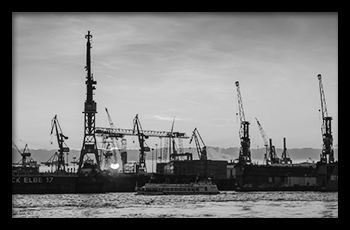This applies to every industry:
Suppliers, personnel including temporary workers and external service providers must be regularly checked against current sanctions lists.
The personal financial embargoes are aimed at two basic obligations/prohibitions:
- Freezing of funds and economic resources
- Prohibition of provision
No economic operator may pay money for goods, services, wages, etc. to persons/companies on the sanctions lists.
Similarly, no products or economic resources may be made available that could in turn release financial resources.



Production industry
MECHANICAL ENGINEERING / ELECTRICAL INDUSTRY / CHEMICAL INDUSTRY / TRADE / CONSTRUCTION
The situation is clear for the entire manufacturing sector. As mentioned above, all areas need to be examined. This includes all suppliers and customers as well as all employees, contractors, subcontractors or other persons paid by the company. The differences from company to company are primarily reflected in the way the audit is integrated into existing business processes and the IT environment.
Trade and logistics
Trade: As one of the few exceptions, the selling trade is not affected by its customers' obligation to inspect so-called "counter businesses". This fact results from the "reasonableness regulation", which does not allow all customers of the (retail) trade to identify themselves, if only for reasons of data protection.
However, the situation is different when the goods are sold in "quantities not normally traded". In this case, the legislator assumes that the goods are used by the acquiring customer for further sale and serve the purpose of making a profit. This again results - according to the legal basis - in a trade between one or more suppliers and customers which is subject to verification.
But with this above-mentioned relaxation of the inspection obligation, even the trade cannot completely escape the inspections against the sanctions lists! This is because in this industry, too, there is a compulsory obligation to check employees and suppliers.
Similarly, the removal of the obligation to inspect does not apply to mail order business. Here it is assumed that for reasons of dispatch alone, the customer data must be available in any case. There is no reason for a release on the basis of the "reasonableness regulation" which underlies the classical trade, so that also in this case an examination must take place in any case.
Logistics: Here the situation must be viewed in a more differentiated manner. On the one hand, the logistics company delivers economic goods and may be obliged to check the sanctions lists. However, this service does not take place in direct negotiation with the customer, as this is usually done by the client.
In case of doubt, the logistics operator is always on the safe side when checking against the sanctions lists, not least because the sanctions lists also include means of transport such as ships and aircraft (see, for example, Iran Air). Furthermore, in the direct vicinity of the company, there is also a duty to check employees and other trading partners (e.g. buying or selling a truck). Thus, in the end, there is no possibility of withdrawing from responsibility in this industry.
On the other hand, the situation is very clear in all respects and without exception when considering the AEO/AEO status. Since the entire supply chain is considered, the logistics company is also obliged to comply with the EC anti-terrorism regulation.
Import/export oriented industries
In this case, it is absolutely essential to check all customers against the sanctions lists! Only in the case of the sanctions lists to be used for the check is a decision to be made. It can often be observed that the parent company, cooperation partners, the customer or other persons/companies involved in the trade specify exactly against which list(s) is/are to be checked. Another point to be considered is the specification of the AEO status.
Internal market-oriented companies
The effectiveness of the EC Anti-Terrorism Regulation is completely independent of any import/export activity and affects all economic operators equally in domestic trade.
Since the focus of personal embargoes is not on countries and regions, but on the person concerned, it must also be ensured here that no trade is conducted with persons on the lists. Because the listed persons can be located anywhere in the world at any time, even in Germany!
And again, regarding the AEO/AEO status - especially considering the obligation of monitoring the whole supply chain - a continuous checking is essential.
Real estate and notaries
Real estate may not be bought or sold by persons on the sanctions lists!
It is also prohibited to rent out commercially used objects to sanctioned persons!
Notaries find their predominant main activity in the notarisation of legal transactions of all kinds. So it is almost unspokenly obvious here that there is of course a compelling necessity for verification and that it is already necessary in the first step to find out whether the persons involved are at all entitled to carry out corresponding legal transactions.
Taxes and law
Tax consultants are available to their clients in an advisory capacity for all their financial transactions. Thus it should be a matter of course to carry out the inspection of certain objects or persons in order to ensure that investments can be made and/or funds can be invested.
In addition, such a step not only secures the company's own good reputation, but also ensures a solid and satisfied customer base in the sense of customer friendliness.
Lawyers should see it as a service to their clientele to check the opponents of the law. Furthermore, it should be in the own interest of every lawyer to check whether his own client is on the sanctions lists.
For it is not only in the event of a lengthy legal dispute that banks can freeze your client's accounts on the basis of their own obligations and thus ultimately threaten to forfeit the fee!
Even though a general review of clients is not mandatory, as it rarely involves the provision of goods or financial benefits - who wants to work for free on the basis of such a single, unperformed review?
Bank and insurance
Banks are in any case obliged to freeze funds immediately if there is a link with sanctioned persons. It goes without saying that no loans or interest may be paid out to a corresponding client in return.
Insurance companies it is generally prohibited to disburse funds to persons/companies on the sanctions lists. It is therefore advisable to carry out a check before taking out the insurance policy and, if necessary, to reject the interested party in order to avoid further disputes that could be costly and time-consuming.
Sounds complicated?
With ID.prove it is very simple. Convince yourself. Why not right now?
test versionID.prove
ID.prove is made by rausoft GmbH.
For more than 15 years now more than 1000 clients have been working with our compliance software.
Links
Our partners
Contact
rausoft GmbH
Böblinger Strasse 25
71229 Leonberg
Fon +49 (0)7152 / 31 961 - 0
Fax +49 (0)7152 / 31 961 - 90